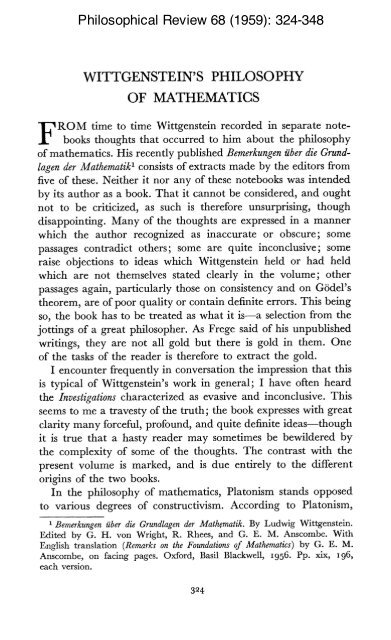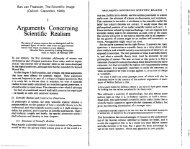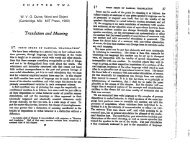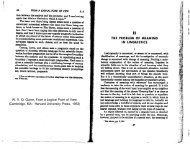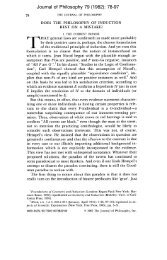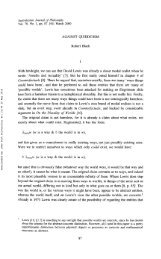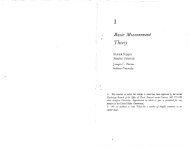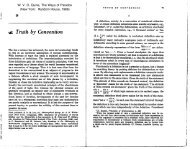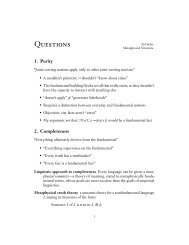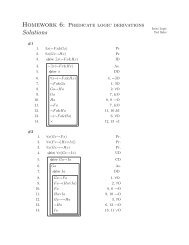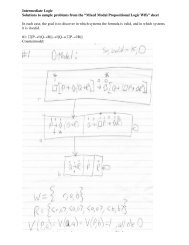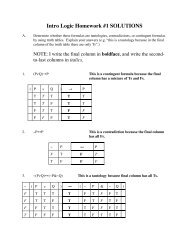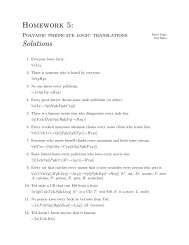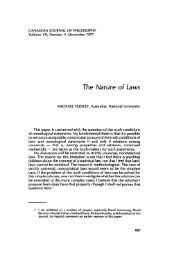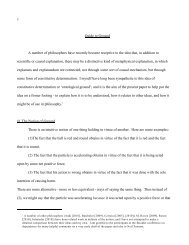Dummett - Wittgenstein's Philosophy of Mathematics.pdf - Ted Sider
Dummett - Wittgenstein's Philosophy of Mathematics.pdf - Ted Sider
Dummett - Wittgenstein's Philosophy of Mathematics.pdf - Ted Sider
Create successful ePaper yourself
Turn your PDF publications into a flip-book with our unique Google optimized e-Paper software.
WITTGENSTEIN'S PHILOSOPHY<br />
OF MATHEMATICS<br />
FROM time to time Wittgenstein recorded in separate notebooks<br />
thoughts that occurred to him about the philosophy<br />
<strong>of</strong> mathematics. His recently published Bemerkungen fiber die Grundlagen<br />
der Mathematik1 consists <strong>of</strong> extracts made by the editors from<br />
five <strong>of</strong> these. Neither it nor any <strong>of</strong> these notebooks was intended<br />
by its author as a book. That it cannot be considered, and ought<br />
not to be criticized, as such is therefore unsurprising, though<br />
disappointing. Many <strong>of</strong> the thoughts are expressed in a manner<br />
which the author recognized as inaccurate or obscure; some<br />
passages contradict others; some are quite inconclusive; some<br />
raise objections to ideas which Wittgenstein held or had held<br />
which are not themselves stated clearly in the volume; other<br />
passages again, particularly those on consistency and on Gbdel's<br />
theorem, are <strong>of</strong> poor quality or contain definite errors. This being<br />
so, the book has to be treated as what it is-a selection from the<br />
jottings <strong>of</strong> a great philosopher. As Frege said <strong>of</strong> his unpublished<br />
writings, they are not all gold but there is gold in them. One<br />
<strong>of</strong> the tasks <strong>of</strong> the reader is therefore to extract the gold.<br />
I encounter frequently in conversation the impression that this<br />
is typical <strong>of</strong> <strong>Wittgenstein's</strong> work in general; I have <strong>of</strong>ten heard<br />
the Investigations characterized as evasive and inconclusive. This<br />
seems to me a travesty <strong>of</strong> the truth; the book expresses with great<br />
clarity many forceful, pr<strong>of</strong>ound, and quite definite ideas-though<br />
it is true that a hasty reader may sometimes be bewildered by<br />
the complexity <strong>of</strong> some <strong>of</strong> the thoughts. The contrast with the<br />
present volume is marked, and is due entirely to the different<br />
origins <strong>of</strong> the two books.<br />
In the philosophy <strong>of</strong> mathematics, Platonism stands opposed<br />
to various degrees <strong>of</strong> constructivism. According to Platonism,<br />
1 Bemerkungen tiber die Grundlagen der Mathematik. By Ludwig Wittgenstein.<br />
Edited by G. H. von Wright, R. Rhees, and G. E. M. Anscombe. With<br />
English translation (Remarks on the Foundations <strong>of</strong> <strong>Mathematics</strong>) by G. E. M.<br />
Anscombe, on facing pages. Oxford, Basil Blackwell, I956. Pp. xix, I96,<br />
each version.<br />
324
WITTGENSTEIN ON MATHEMATICS<br />
mathematical objects are there and stand in certain relations to<br />
one another, independently <strong>of</strong> us, and what we do is to discover<br />
these objects and their relations to one another. The constructivist<br />
usually opposes to this the picture <strong>of</strong> our making, constructing,<br />
the mathematical entities as we go along. For the Platonist, the<br />
meaning <strong>of</strong> a mathematical statement is to be explained in terms<br />
<strong>of</strong> its truth-conditions; for each statement, there is something in<br />
mathematical reality in virtue <strong>of</strong> which it is either true or false.<br />
An example <strong>of</strong> the explanation <strong>of</strong> meaning in terms <strong>of</strong> truth and<br />
falsity is the truth-table explanation <strong>of</strong> the sentential connectives.<br />
For the constructivist, the general form <strong>of</strong> an explanation <strong>of</strong><br />
meaning must be in terms <strong>of</strong> the conditions under which we<br />
regard ourselves as justified in asserting a statement, that is, the<br />
circumstances in which we are in possession <strong>of</strong> a pro<strong>of</strong>. For<br />
instance, a statement made up <strong>of</strong> two statements joined by a<br />
connective is to be explained by explaining a claim to have<br />
proved the complex statement in terms <strong>of</strong> what a claim to have<br />
proved the constituent statements consists in; thus a claim to<br />
have proved rA or B1 will be a claim to have a method leading<br />
either to a pro<strong>of</strong> <strong>of</strong> A or to a pro<strong>of</strong> <strong>of</strong> B. What in practice this<br />
will lead to will depend upon the degree <strong>of</strong> constructivism<br />
adopted; for example, if we confine ourselves to decidable state-<br />
ments, then the truth-tables will receive an acceptable inter-<br />
pretation and the whole classical logic will be applicable; if, on<br />
the other hand, we allow with the intuitionists a much wider<br />
range <strong>of</strong> mathematical statements to be considered as intelligible,<br />
then the law <strong>of</strong> excluded middle and many other classically valid<br />
laws will cease to hold generally. But in either case it is the notion<br />
<strong>of</strong> pro<strong>of</strong> and not the notions <strong>of</strong> truth and falsity which is for the<br />
constructivist central to the account <strong>of</strong> the meaning <strong>of</strong> mathe-<br />
matical statements.<br />
We may regard Platonism and the various varieties <strong>of</strong> construc-<br />
tivism not as rivals but merely as means <strong>of</strong> demarcating different<br />
areas <strong>of</strong> mathematics with respect not to subject matter but to<br />
methods <strong>of</strong> pro<strong>of</strong>. In this- case there are only the essentially<br />
mathematical problems <strong>of</strong> formulating clearly the different<br />
conceptions and investigating in detail the mathematical con-<br />
sequences <strong>of</strong> each. If, on the other hand, one regards the different<br />
325
MICHAEL DUMMETT<br />
schools as rivals, there remains the philosophical problem <strong>of</strong><br />
deciding which <strong>of</strong> the various accounts is correct. <strong>Wittgenstein's</strong><br />
book is intended as a contribution to the latter task only. It seems<br />
natural to suppose that the philosophical task and the mathe-<br />
matical go hand in hand, for the precise formulation <strong>of</strong> a con-<br />
ception is not irrelevant to deciding on its correctness, and<br />
unexpected consequences <strong>of</strong> adopting it may lead one to revise<br />
one's opinion as to its value. Wittgenstein will have none <strong>of</strong> this:<br />
for him philosophy and mathematics have nothing to say to one<br />
another; no mathematical discovery can have any bearing on<br />
the philosophy <strong>of</strong> mathematics.2 It would seem that he is theoreti-<br />
cally committed also to the converse, that no philosophical opinion<br />
could, or at least ought to, affect the procedure <strong>of</strong> the mathe-<br />
matician. This comes out to some extent in his discussion <strong>of</strong> the<br />
law <strong>of</strong> excluded middle in mathematics. Against one who insisted<br />
that either the sequence "77777" occurs in the development <strong>of</strong><br />
r or it does not, he employs arguments similar to those <strong>of</strong> the<br />
intuitionists; and yet it appears that he is not wishing to question<br />
the validity in a mathematical pro<strong>of</strong> <strong>of</strong>, for example, argument<br />
by cases, but only to reprove someone who in the course <strong>of</strong><br />
philosophical reflection wishes to insist on the law <strong>of</strong> excluded<br />
middle.3 Yet this is not to be taken too seriously, for Wittgenstein<br />
would always be able to claim that, while he had not shown<br />
that certain mathematical procedures were wrong, still he had<br />
shown them not to have the interest we were inclined to attach<br />
to them. Certainly in his discussion <strong>of</strong> Cantor he displays no<br />
timidity about "interfering with the mathematicians."4 I think<br />
that there is no ground for <strong>Wittgenstein's</strong> segregation <strong>of</strong> philos-<br />
ophy from mathematics but that this springs only from a general<br />
tendency <strong>of</strong> his to regard discourse as split up into a number<br />
<strong>of</strong> distinct islands with no communication between them (state-<br />
ments <strong>of</strong> natural science, <strong>of</strong> philosophy, <strong>of</strong> mathematics, <strong>of</strong><br />
religion).<br />
As Frege showed, the nominalist objection to Platonism-that<br />
talk about "abstract entities" is unintelligible-is ill-taken; if we<br />
2 Cf. V, 13, 19; IV, 52; also Investigations, II, xiv; I, 124.<br />
3 IV, 10.<br />
4 I, App. I I.<br />
326
WITTGENSTEIN ON MA THEMA TICS<br />
believe in the objectivity <strong>of</strong> mathematics, then there is no objec-<br />
tion to our thinking in terms <strong>of</strong> mathematical objects, nor to<br />
the picture <strong>of</strong> them as already there waiting to be discovered<br />
that goes with it. Nor is formalism a real alternative. The formalist<br />
insists that the content <strong>of</strong> a mathematical theorem is simply that<br />
if there is any domain for which the axioms hold good, then the<br />
theorem will also hold good for that domain; and he will add<br />
that so long as we do not know the axioms to be categorical,<br />
a statement <strong>of</strong> the theory need not be either true or false. But<br />
he will not reject the classical logic, since he will agree that in<br />
any particular domain for which the axioms hold, the statement<br />
will be either true or false; and furthermore, he will allow that<br />
any given statement either does or does not follow from the<br />
axioms. Since the statement that there exists a pro<strong>of</strong> <strong>of</strong> a given<br />
statement from given axioms is in exactly the same position as,<br />
say, an existence-statement in number theory for which we have<br />
neither pro<strong>of</strong> nor dispro<strong>of</strong>, the formalist has gained no advantage;<br />
he has merely switched from one kind <strong>of</strong> mathematical object-<br />
numbers-to another-formal pro<strong>of</strong>s.<br />
Wittgenstein adopts a version (as we shall see, an extreme<br />
version) <strong>of</strong> constructivism; for him it is <strong>of</strong> the essence <strong>of</strong> a<br />
mathematical statement that it is asserted as the conclusion <strong>of</strong><br />
a pro<strong>of</strong>, whereas I suppose that for a Platonist a being who<br />
had direct apprehension <strong>of</strong> mathematical truth, not mediated by<br />
inferences, would not be a complete absurdity. There are many<br />
different lines <strong>of</strong> thought converging upon <strong>Wittgenstein's</strong> con-<br />
structivism; I shall deal first with his conception <strong>of</strong> logical<br />
necessity.<br />
A great many philosophers nowadays subscribe to some form<br />
<strong>of</strong> conventionalist account <strong>of</strong> logical necessity, and it is perhaps<br />
difficult to realize what a liberation was effected by this theory.<br />
The philosophical problem <strong>of</strong> necessity is tw<strong>of</strong>old: what is its<br />
source, and how do we recognize it? God can ordain that some-<br />
thing shall hold good <strong>of</strong> the actual world; but how can even<br />
God ordain that something is to hold good in all possible worlds?<br />
We know what it is to set about finding out if something is true;<br />
but what account can we give <strong>of</strong> the process <strong>of</strong> discovering<br />
whether it must be true? According to conventionalism, all<br />
327
MICHAEL DUMMETT<br />
necessity is imposed by us not on reality, but upon our language;<br />
a statement is necessary by virtue <strong>of</strong> our having chosen not to<br />
count anything as falsifying it. Our recognition <strong>of</strong> logical necessity<br />
thus becomes a particular case <strong>of</strong> our knowledge <strong>of</strong> our own<br />
intentions.<br />
The conventionalism that is so widespread is, however, a<br />
modified conventionalism. On this view, although all necessity<br />
derives from linguistic conventions that we have adopted, the<br />
derivation is not always direct. Some necessary statements are<br />
straightforwardly registers <strong>of</strong> conventions we have laid down;<br />
others are more or less remote consequences <strong>of</strong> conventions. Thus<br />
"Nothing can at the same time be green and blue all over"<br />
is a direct register <strong>of</strong> a convention, since there is nothing in the<br />
ostensive training we give in the use <strong>of</strong> color-words which shows<br />
that we are not to call something on the borderline between<br />
green and blue "both green and blue." "Nothing can be both<br />
green and red," on the other hand, is necessary in consequence<br />
<strong>of</strong> the meanings <strong>of</strong> "green" and "red" as shown in the ostensive<br />
training. We did not need to adopt a special convention excluding<br />
the expression "both green and red" from our language, since<br />
the use by someone <strong>of</strong> this expression would already show that<br />
he had not learned what he was supposed to have learned from<br />
the ostensive training.<br />
When applied to mathematics, this modified conventionalism<br />
results in the sort <strong>of</strong> account <strong>of</strong> mathematical truth with which<br />
we are so familiar from logical positivist writings. The axioms<br />
<strong>of</strong> a mathematical theory are necessary in virtue <strong>of</strong> their being<br />
direct registers <strong>of</strong> certain conventions we have adopted about the<br />
use <strong>of</strong> the terms <strong>of</strong> the theory; it is the job <strong>of</strong> the mathematician<br />
to discover the more or less remote consequences <strong>of</strong> our having<br />
adopted these conventions, which consequences are epitomized<br />
in the theorems. If it is inquired what is the status <strong>of</strong> the logical<br />
principles in accordance with which we pass from axioms to<br />
theorems, the reply is that to subscribe to these principles is again<br />
the expression <strong>of</strong> the adoption <strong>of</strong> linguistic conventions, in this<br />
case conventions about the use <strong>of</strong> "if," "all," and so forth. This<br />
account is entirely superficial and throws away all the advantages<br />
<strong>of</strong> conventionalism, since it leaves unexplained the status <strong>of</strong> the<br />
328
WITTGENSTEIN ON MA THEMA TICS<br />
assertion that certain conventions have certain consequences.<br />
It appears that if we adopt the conventions registered by the<br />
axioms, together with those registered by the principles <strong>of</strong> in-<br />
ference, then we must adhere to the way <strong>of</strong> talking embodied in<br />
the theorem; and this necessity must be one imposed upon us,<br />
one that we meet with. It cannot itself express the adoption <strong>of</strong><br />
a convention; the account leaves no room for any further such<br />
convention.<br />
Wittgenstein goes in for a full-blooded conventionalism; for<br />
him the logical necessity <strong>of</strong> any statement is always the direct<br />
expression <strong>of</strong> a linguistic convention. That a given statement is<br />
necessary consists always in our having expressly decided to treat<br />
that very statement as unassailable; it cannot rest on our having<br />
adopted certain other conventions which are found to involve<br />
our treating it so. This account is applied alike to deep theorems<br />
and to elementary computations. To give an example <strong>of</strong> the<br />
latter, the criterion which we adopt in the first place for saying<br />
that there are n things <strong>of</strong> a certain kind is to be explained by<br />
describing the procedure <strong>of</strong> counting. But when we find that there<br />
are five boys and seven girls in a room, we say that there are<br />
twelve children altogether, without counting them all together.<br />
The fact that we are justified in doing this is not, as it were,<br />
implicit in the procedure <strong>of</strong> counting itself; rather, we have<br />
chosen to adopt a new criterion for saying that there are twelve<br />
children, different from the criterion <strong>of</strong> counting up all the<br />
children together. It would seem that, if we have genuinely<br />
distinct criteria for the same statement, they may clash. But the<br />
necessity <strong>of</strong> "5 + 7 = I2" consists just in this, that we do not<br />
count anything as a clash; if we count the children all together<br />
and get eleven, we say, "We must have miscounted."<br />
This account is very difficult to accept, since it appears that<br />
the mathematical pro<strong>of</strong> drives us along willy-nilly until we arrive<br />
at the theorem. (Of course, we learned "5 + 7 = i2" by rote;<br />
but we could produce an argument to prove it if the need arose.)<br />
But here Wittgenstein brings in the considerations about rules<br />
presented in the Investigations and elsewhere. A pro<strong>of</strong> proceeds<br />
according to certain logical principles or rules <strong>of</strong> inference. We<br />
are inclined to suppose that once we have accepted the axioms<br />
329
MICHAEL DUMMETT<br />
from which the pro<strong>of</strong> starts, we have, as it were, no further<br />
active part to play; when the pro<strong>of</strong> is shown us, we are mere<br />
passive spectators. But in order to follow the pro<strong>of</strong>, we have to<br />
recognize various transitions as applications <strong>of</strong> the general rules<br />
<strong>of</strong> inference. Now even if these rules had been explicitly formulated<br />
at the start, and we had given our assent to them, our doing<br />
so would not in itself constitute recognition <strong>of</strong> each transition<br />
as a correct application <strong>of</strong> the rules. Once we have the pro<strong>of</strong>,<br />
we shall indeed say that anyone who does not accept it either<br />
cannot really have understood or cannot really have accepted<br />
the rules <strong>of</strong> inference; but it does not have to be the case that<br />
there was anything in what he said or did before he rejected<br />
the pro<strong>of</strong> which revealed such a misunderstanding or rejection<br />
<strong>of</strong> the rules <strong>of</strong> inference. Hence at each step we are free to choose<br />
to accept or reject the pro<strong>of</strong>; there is nothing in our formulation<br />
<strong>of</strong> the axioms and <strong>of</strong> the rules <strong>of</strong> inference, and nothing in our<br />
minds when we accepted these before the pro<strong>of</strong> was given, which<br />
<strong>of</strong> itself shows whether we shall accept the pro<strong>of</strong> or not; and<br />
hence there is nothing which forces us to accept the pro<strong>of</strong>. If<br />
we accept the pro<strong>of</strong>, we confer necessity on the theorem proved;<br />
we "put it in the archives" and will count nothing as telling<br />
against it. In doing this we are making a new decision, and not<br />
merely making explicit a decision we had already made implicitly.<br />
A natural reaction to this is to say that it is true enough when<br />
we have not formulated our principles <strong>of</strong> inference, or have<br />
formulated them only in an imprecise form, but that it does not<br />
apply at all when we have achieved a strict formalization.<br />
<strong>Wittgenstein's</strong> hostility to mathematical logic is great; he says<br />
that it has completely distorted the thinking <strong>of</strong> philosophers.5<br />
Because this remark as it stands is so plainly silly, it is difficult<br />
to get a clear view <strong>of</strong> the matter. Consider a favorite example<br />
<strong>of</strong> <strong>Wittgenstein's</strong>: you train someone to obey orders <strong>of</strong> the form<br />
"Add n" with examples taken from fairly small numbers, then<br />
give him the order "Add one" and find that he adds two for<br />
numbers from ioo to i99, three for numbers from 200 to 299,<br />
and so forth. Wittgenstein says that there need have been nothing<br />
5 IV, 48.<br />
330
WITTGENSTEIN ON MA THEMA TICS<br />
either in what you said to him during the training or in what<br />
''went on in your mind" then which <strong>of</strong> itself showed that this<br />
was not what you intended. This is certainly true, and shows<br />
something important about the concept <strong>of</strong> intention (it is a very<br />
striking case <strong>of</strong> what Wittgenstein means when he says in the<br />
Investigations that if God had looked into my mind, he would<br />
not have been able to see there whom I meant). But suppose<br />
the training was not given only by example, but made use also<br />
<strong>of</strong> an explicit formulation <strong>of</strong> the rule for forming from an Arabic<br />
numeral its successor. A machine can follow this rule; whence<br />
does a human being gain a freedom <strong>of</strong> choice in this matter<br />
which the machine does not possess?<br />
It would <strong>of</strong> course be possible to argue that someone might<br />
appear to understand a rule <strong>of</strong> inference in a formal system<br />
-a substitution rule, say-and yet later reject a correct applica-<br />
tion <strong>of</strong> it; but it remains that we can see in the precise wording<br />
<strong>of</strong> the rule that that application was warranted. It might be<br />
replied that this is to take for granted the ordinary understanding<br />
<strong>of</strong> the words or symbols in terms <strong>of</strong> which the rule is framed;<br />
an explanation <strong>of</strong> these words or symbols would be something<br />
like <strong>Wittgenstein's</strong> idea <strong>of</strong> a rule for interpreting the rule. It is<br />
undoubtedly true and important that, while in using a word or<br />
symbol we are in some sense following a rule, this rule cannot in<br />
its turn be formulated in such a way as to leave no latitude in<br />
its interpretation, or if it can, the rules for using the words in<br />
terms <strong>of</strong> which this rule is formulated cannot in their turn be<br />
so formulated. But such considerations seem to belong to the<br />
theory <strong>of</strong> meaning in general, rather than having any particular<br />
relevance to the philosophy <strong>of</strong> mathematics. Rather, it seems<br />
that to someone who suggests that <strong>Wittgenstein's</strong> point about<br />
the scope left in deciding on the correctness <strong>of</strong> an application <strong>of</strong><br />
a rule <strong>of</strong> inference is to be countered by concentrating on rules<br />
<strong>of</strong> inference in formal systems we ought to reply by referring<br />
to what Wittgenstein calls the "motley" <strong>of</strong> mathematics.6 He<br />
wishes, like the intuitionists, to insist that we cannot draw a<br />
line in advance round the possible forms <strong>of</strong> argument that may<br />
6 II, 46, 48.<br />
33I
MICHAEL DUMMETT<br />
be used in mathematical pro<strong>of</strong>s. Furthermore, it might be pointed<br />
out that a formal system does not replace the intuitive pro<strong>of</strong>s as,<br />
frequently, a precise concept replaces a vague intuitive one; the<br />
formal system remains, as it were, answerable to the intuitive<br />
conception, and remains <strong>of</strong> interest only so long as it does not<br />
reveal undesirable features which the intuitive idea does not<br />
possess. An example would be Gbdel's theorem, which shows<br />
that provability in a formal system cannot do duty as a substitute<br />
for the intuitive idea <strong>of</strong> arithmetical truth.<br />
Suppose we are considering a statement <strong>of</strong> some mathematical<br />
theory. To avoid complications, assume that the theory is com-<br />
plete, that is, that it can be completely formalized, but that we<br />
are not thinking <strong>of</strong> any particular formal system. Then a Platonist<br />
will say that there exists either a pro<strong>of</strong> or a dispro<strong>of</strong> <strong>of</strong> the state-<br />
ment; the fact that the statement is true, if it is true, consists<br />
in the existence <strong>of</strong> such a pro<strong>of</strong> even though we have not yet<br />
discovered it. Now if there exists a pro<strong>of</strong>, let us suppose that<br />
there is somewhere an actual document, as yet unseen by human<br />
eyes, on which is written what purports to be a pro<strong>of</strong> <strong>of</strong> the<br />
statement. Then Wittgenstein will reply that all the same there<br />
does not yet exist a pro<strong>of</strong>, since when we discover the document<br />
it is still up to us to decide whether or not we wish to count<br />
it as a pro<strong>of</strong>. It is evident that, if this is correct, then all motive<br />
for saying with the Platonist that there either is or is not a pro<strong>of</strong>,<br />
that the statement must be either true or false, and so forth,<br />
has gone. What is not clear to me is that rejecting the Platonist's<br />
conception involves adopting this line about pro<strong>of</strong>s; it seems to<br />
me that a man might hold that, once the pro<strong>of</strong> was discovered,<br />
we had no choice but to follow it, without allowing the correctness<br />
<strong>of</strong> saying, before the pro<strong>of</strong> was discovered, that either there is a<br />
pro<strong>of</strong> or there is not. I will return to this later.<br />
<strong>Wittgenstein's</strong> conception is extremely hard to swallow, even<br />
though it is not clear what one wishes to oppose to it. The pro<strong>of</strong><br />
is supposed to have the effect <strong>of</strong> persuading us, inducing us, to<br />
count such-and-such a form <strong>of</strong> words as unassailably true, or to<br />
exclude such-and-such a form <strong>of</strong> words from our language. It<br />
seems quite unclear how the pro<strong>of</strong> accomplishes this remarkable<br />
feat. Another difficulty is the scarcity <strong>of</strong> examples. We naturally<br />
332
WITTGENSTEIN ON MA THEMA TICS<br />
think that, face to face with a pro<strong>of</strong>, we have no alternative but<br />
to accept the pro<strong>of</strong> if we are to remain faithful to the under-<br />
standing we already had <strong>of</strong> the expressions contained in it. For<br />
Wittgenstein, accepting the theorem is adopting a new rule <strong>of</strong><br />
language, and hence our concepts cannot remain unchanged at<br />
the end <strong>of</strong> the pro<strong>of</strong>. But we could have rejected the pro<strong>of</strong> without<br />
doing any more violence to oui concepts than is done by accepting<br />
it; in rejecting it we could have remained equally faithful to the<br />
concepts with which we started out. It seems extraordinarily<br />
difficult to take this idea seriously when we think <strong>of</strong> some<br />
particular actual pro<strong>of</strong>. It may <strong>of</strong> course be said that this is<br />
because we have already accepted the pro<strong>of</strong> and thereby subjected<br />
our concepts to the modification which acceptance <strong>of</strong> the pro<strong>of</strong><br />
involved; but the difficulty <strong>of</strong> believing <strong>Wittgenstein's</strong> account<br />
<strong>of</strong> the matter while reading the pro<strong>of</strong> <strong>of</strong> some theorem with<br />
which one was not previously familiar is just as great. We want<br />
to say that we do not know what it would be like for someone<br />
who, by ordinary criteria, already understood the concepts<br />
employed, to reject this pro<strong>of</strong>. Of course we are familiar with<br />
someone's simply not following a pro<strong>of</strong>, but we are also familiar<br />
with the remedy, namely to interpolate simpler steps between<br />
each line <strong>of</strong> the pro<strong>of</strong>. The examples given in <strong>Wittgenstein's</strong><br />
book are-amazingly for him-thin and unconvincing. I think<br />
that this is a fairly sure sign that there is something wrong with<br />
<strong>Wittgenstein's</strong> account.<br />
Consider the case <strong>of</strong> an elementary computation, for example<br />
"5 + 7 = I2." There might be people who counted as we do<br />
but did not have the concept <strong>of</strong> addition. If such a person had<br />
found out by counting that there were five boys and seven girls<br />
in a classroom, and were then asked how many children were<br />
present, he would proceed to count all the children together to<br />
discover the answer. Thus he would be quite prepared to say<br />
that on one occasion there were five boys, seven girls, and twelve<br />
children altogether, but on another occasion five boys, seven<br />
girls, and thirteen children altogether. Now if we came across<br />
such a person, we should know what kind <strong>of</strong> arguments to bring<br />
to show him that in such circumstances he must have miscounted<br />
on one occasion, and that whenever there are five boys and<br />
333
MICHAEL D UMMETT<br />
seven girls there are twelve children. If he accepts these argu-<br />
ments it will be quite true that he will have adopted a new<br />
criterion for saying that there are twelve children present, and<br />
again a new criterion for saying, "I must have miscounted."<br />
Before, he would say, "I miscounted," only when he noticed<br />
that he had, for example, counted one <strong>of</strong> the children twice over;<br />
now he will say, "I miscounted," when he has not observed<br />
anything <strong>of</strong> this kind, simply on the ground that he got the result<br />
that there were five boys, seven girls, and thirteen children.<br />
But we wish to say that even before we met this person and<br />
taught him the principles <strong>of</strong> addition, it would have been true<br />
that if he had counted five boys, seven girls, and thirteen<br />
children, he would have been wrong even according to the<br />
criteria he himself then acknowledged. That is, he must have<br />
made a mistake in counting; and if he made a mistake, then<br />
there must have been something that he did which, if he had<br />
noticed it, he himself would then have allowed as showing that<br />
he had miscounted.<br />
If we say that if he counted five boys, seven girls, and thirteen<br />
children, then there must have been something which, if he had<br />
noticed it, he would have regarded as a criterion for having<br />
miscounted, then the effect <strong>of</strong> introducing him to the concept <strong>of</strong><br />
addition is not to be simply described as persuading him to adopt<br />
a new criterion for having miscounted; rather, he has been<br />
induced to recognize getting additively discordant results as a<br />
symptom <strong>of</strong> the presence <strong>of</strong> something he already accepted as a<br />
criterion for having miscounted. That is, learning about addition<br />
leads him to say, "I miscounted," in circumstances where he<br />
would not before have said it; but if, before he had learned,<br />
he had said, "I miscounted," in those circumstances, he would<br />
have been right by the criteria he then possessed. Hence the<br />
necessity for his having miscounted when he gets additively<br />
discordant results does not, as it were, get its whole being from<br />
his now recognizing such results as a criterion for having mis-<br />
counted.<br />
If on the other hand we say that it is possible to count five<br />
boys, seven girls, and thirteen children without there being<br />
anything other than the fact <strong>of</strong> getting these results such that,<br />
334
WITTGENSTEIN ON MA THEMA TICS<br />
if we had noticed it, we should have regarded it as a ground<br />
for saying that we had miscounted, then it appears to follow<br />
that one can make a mistake in counting (according to the<br />
criteria we recognize for having miscounted) without having made<br />
any particular mistake; that is, one cannot say that if one has<br />
miscounted, then either one counted this boy twice, or one<br />
counted that girl twice, or .... But this is absurd: one cannot<br />
make some mistake without there having been some particular<br />
mistake which one has made. It might be replied that we can<br />
choose to say that if one has miscounted, then either . . ., and<br />
that that is in fact what we do choose to say. But if a disjunction<br />
is true, then at least one <strong>of</strong> its limbs must be true; and if a state-<br />
ment is true, there must be something such that if we knew<br />
<strong>of</strong> it, we would regard it as a criterion for the truth <strong>of</strong> the state-<br />
ment. Yet the assumption from which we started is that someone<br />
counts five boys, seven girls, and thirteen children (and hence<br />
says that he must have miscounted) and that there is nevertheless<br />
nothing apart from his having got these results which (if he<br />
knew <strong>of</strong> it) he would regard as showing that he had miscounted;<br />
and hence there can be nothing which (if he knew <strong>of</strong> it) would<br />
show the truth <strong>of</strong> any one <strong>of</strong> the disjuncts <strong>of</strong> the form "He counted<br />
that boy twice," and so forth. One might put it by saying that<br />
if a disjunction is true, God must know which <strong>of</strong> the disjuncts<br />
is true; hence it cannot be right to count something as a criterion<br />
for the truth <strong>of</strong> the disjunction whose presence does not guarantee<br />
the existence <strong>of</strong> something which would show the truth <strong>of</strong> some<br />
one particular disjunct. For example, it would be wrong to<br />
regard rEither if it had been the case that P, it would have been<br />
the case that Q, or if it had been the case that P, it would have<br />
been the case that not Qn as a logical law, since it is perfectly<br />
possible to suppose that however much we knew about the kind<br />
<strong>of</strong> fact which we should regard as bearing on the truth <strong>of</strong> the<br />
disjunct counterfactuals, we should still know nothing which we<br />
should count as a reason for accepting either the one or the<br />
other.<br />
It is certainly part <strong>of</strong> the meaning <strong>of</strong> the word "true" that<br />
if a statement is true, there must be something in virtue <strong>of</strong> which<br />
it is true. "There is something in virtue <strong>of</strong> which it is true"<br />
335
MICHAEL DUMMETT<br />
means: there is something such that if we knew <strong>of</strong> it we should<br />
regard it as a criterion (or at least as a ground) for asserting<br />
the statement. The essence <strong>of</strong> realism is this: for any statement<br />
which has a definite sense, there must be something in virtue<br />
<strong>of</strong> which either it or its negation is true. (Realism about the<br />
realm <strong>of</strong> mathematics is what we call Platonism.) Intuitionists<br />
do not at all deny the first thesis; for them one is justified in<br />
asserting a disjunction only when one has a method for arriving<br />
at something which would justify the assertion <strong>of</strong> some one<br />
particular limb <strong>of</strong> the disjunction. Rather, they deny the second<br />
thesis: there is no reason for supposing in general that, just<br />
because a statement has a quite definite use, there must be<br />
something in virtue <strong>of</strong> which either it is true or it is false. One<br />
must beware <strong>of</strong> saying that logical truths are an exception, that<br />
there is nothing in virtue <strong>of</strong> which they are true; on the contrary,<br />
for the realist we are justified in asserting rP or not P1 because<br />
there must be something in virtue <strong>of</strong> which either P or rNot P'<br />
is true, and hence in any case there must be something in virtue<br />
<strong>of</strong> which rp or not P1 is true.<br />
Now there seems here to be one <strong>of</strong> the big differences between<br />
Wittgenstein and the intuitionists. He appears to hold that it<br />
is up to us to decide to regard any statement we happen to pick<br />
on as holding necessarily, if we choose to do so.7 The idea behind<br />
this appears to be that, by laying down that something is to<br />
be regarded as holding necessarily, we thereby in part determine<br />
the sense <strong>of</strong> the words it contains; since we have the right to<br />
attach what sense we choose to the words we employ, we have<br />
the right to lay down as necessary any statement we choose to<br />
regard as such. Against this one would like to say that the senses<br />
<strong>of</strong> the words in the statement may have already been fully<br />
determined, so that there is no room for any further determina-<br />
tion. Thus, if one takes a classical (realist) view, the general<br />
form <strong>of</strong> explanation <strong>of</strong> the sense <strong>of</strong> a statement consists in the<br />
stipulation <strong>of</strong> its truth-conditions (this is the view taken by<br />
Wittgenstein in the Tractatus and also the view <strong>of</strong> Frege). Thus<br />
the sense <strong>of</strong> the sentential operators is to be explained by means<br />
7Cf. V, 23, last par. on p. I79.<br />
336
WITTGENSTEIN ON MA THEMA TICS<br />
<strong>of</strong> truth-tables; it is by reference to the truth-tables that one<br />
justifies taking certain forms as logically true.<br />
Since the intuitionist rejects the conception according to which<br />
there must be for every statement something in virtue <strong>of</strong> which<br />
either it is true or it is false (and does not regard it as possible<br />
to remedy the situation by the introduction <strong>of</strong> further truth-<br />
values), for him the fundamental form <strong>of</strong> an explanation <strong>of</strong> a<br />
statement's meaning consists in stating the criteria we recognize<br />
as justifying the assertion <strong>of</strong> the statement (in mathematics, this<br />
is in general the possession <strong>of</strong> a pro<strong>of</strong>). We thus specify the sense<br />
<strong>of</strong> the sentential operators, <strong>of</strong> "or," for example, by explaining<br />
the criteria for asserting the complex statement in terms <strong>of</strong> the<br />
criteria for asserting the constituents; hence, roughly speaking,<br />
we are justified in asserting rFP or Q7 only when we are justified<br />
either in asserting P or in asserting Q. A logical law holds in<br />
virtue <strong>of</strong> these explanations; by reference to them we see that<br />
we shall always be justified in asserting a statement <strong>of</strong> this form.<br />
<strong>Wittgenstein's</strong> quite different idea, that one has the right<br />
simply to lay down that the assertion <strong>of</strong> a statement <strong>of</strong> a given<br />
form is to be regarded as always justified, without regard to the<br />
use that has already been given to the words contained in the<br />
statement, seems to me mistaken. If Wittgenstein were right, it<br />
appears to me that communication would be in constant danger<br />
<strong>of</strong> simply breaking down. The decision to count a particular<br />
form <strong>of</strong> statement as logically true does not affect only the sense<br />
<strong>of</strong> statements <strong>of</strong> that form; the senses <strong>of</strong> all sorts <strong>of</strong> other state-<br />
ments will be infected, and in a way that we shall be unable<br />
to give a direct account <strong>of</strong>, without reference to our taking the<br />
form <strong>of</strong> statement in question as logically true. Thus it will<br />
become impossible to give an account <strong>of</strong> the sense <strong>of</strong> any statement<br />
without giving an account <strong>of</strong> the sense <strong>of</strong> every statement, and<br />
since it is <strong>of</strong> the essence <strong>of</strong> language that we understand new<br />
statements, this means that it will be impossible to give an account<br />
<strong>of</strong> the use <strong>of</strong> our language at all. To give an example: suppose<br />
someone were to choose to regard as a logical law the counter-<br />
factual disjunction I mentioned above. We try to object to his<br />
claim that this is logically valid by observing that either he<br />
must admit that a disjunction may be true when neither limb<br />
337
MICHAEL DUMMETT<br />
is true, or that a counterfactual may be true when there is nothing<br />
in virtue <strong>of</strong> which it is true, that is, nothing such that if we<br />
knew <strong>of</strong> it we should regard it as a ground for asserting the<br />
counterfactual. But he may respond by denying that these con-<br />
sequences follow; rather, he adduces it as a consequence <strong>of</strong> the<br />
validity <strong>of</strong> the law that there must be something such that if<br />
we knew <strong>of</strong> it we should count it as a ground either for asserting<br />
rIf it had been the case that P, then it would have been the<br />
case that OQ or for asserting rIf it had been the case that P,<br />
then it would have been the case that not Q.1 For example,<br />
he will say that there must be something in which either the<br />
bravery or the cowardice <strong>of</strong> a man consisted, even if that man<br />
had never encountered danger and hence had never had an<br />
opportunity to display either courage or cowardice. If we hold<br />
that he is entitled to regard anything as a logical law which<br />
he chooses so to regard, then we cannot deny him the right to<br />
draw this conclusion. The conclusion follows from the disjunction<br />
<strong>of</strong> counterfactuals which he elected to regard as logically true<br />
in the first place, together with statements we should all regard<br />
as logically true; and in any case, he must have the right to<br />
regard the conclusion itself as logically true if he so chooses.<br />
He will thus conclude that either a man must reveal in his<br />
behavior how he would behave in all possible circumstances,<br />
or else that there is inside him a sort <strong>of</strong> spiritual mechanism<br />
determining how he behaves in each situation.<br />
Now we know from the rest <strong>of</strong> <strong>Wittgenstein's</strong> philosophy how<br />
repugnant such a conclusion would be to him; but what right<br />
would he have, on his own account <strong>of</strong> the matter, to object to<br />
this man's reaching this conclusion? It is all very well to say,<br />
"Say what you like once you know what the facts are"; but<br />
how are we to be sure that we can tell anyone what the facts<br />
are if it may be that the form <strong>of</strong> words we use to tell him the<br />
facts has for him a different sense as a result <strong>of</strong> his having adopted<br />
some logical law which we do not accept? It might be said that<br />
once we discover this difference in the understanding <strong>of</strong> a certain<br />
form <strong>of</strong> words, we must select another form <strong>of</strong> words which he<br />
does understand as we do and which expresses what we wanted<br />
to say; but how are we to know that there is a form <strong>of</strong> words which<br />
338
WITTGENSTEIN ON MATHEMATICS<br />
does the trick? If we ask him how he understands a certain<br />
statement, and he gives the same explanation <strong>of</strong> it that we should<br />
give, this is no guarantee that he in fact understands it as we do;<br />
for the mere fact that he recognizes certain forms as logically<br />
true which we do not recognize means that he may be able to<br />
construct arguments leading to the given statement as a conclusion<br />
and with premises that we accept, although we should not accept<br />
the argument; that is, he will regard himself as entitled to assert<br />
the statement in circumstances in which we should not regard<br />
ourselves as entitled to assert it. (An analogy, not strictly parallel,<br />
is this: we might imagine a classicist and an intuitionist giving<br />
explanations <strong>of</strong> the meaning <strong>of</strong> the existential quantifier which<br />
sounded exactly the same. Yet for all that the classicist will make<br />
existential assertions in cases in which the intuitionist will not,<br />
since he has been able to arrive at them by means <strong>of</strong> arguments<br />
which the intuitionist will not accept.) Now in the case we are<br />
imagining, it is essential to suppose that our man is not capable<br />
<strong>of</strong> giving any general kind <strong>of</strong> explanation <strong>of</strong> the words he uses<br />
such that we can, from this explanation, derive directly the<br />
meaning he attaches to any sentence composed <strong>of</strong> these words.<br />
For if he could give such an explanation, we could see from the<br />
explanation why the logical law which he accepts but we do<br />
not is necessary if the words in it are understood as he understands<br />
them. We should thus have a justification for taking statements<br />
<strong>of</strong> that form to be logical laws parallel to the justification <strong>of</strong> the<br />
laws <strong>of</strong> classical logic in terms <strong>of</strong> an explanation <strong>of</strong> meaning by<br />
reference to truth-conditions and the justification <strong>of</strong> intuitionist<br />
logic in terms <strong>of</strong> the explanation by reference to assertibility-<br />
conditions. But the whole point <strong>of</strong> the example was that this<br />
was a case <strong>of</strong> simply laying down a certain form <strong>of</strong> statement<br />
as logically true without the requirement <strong>of</strong> a justification <strong>of</strong><br />
this kind.<br />
This attitude <strong>of</strong> <strong>Wittgenstein's</strong> to logical necessity may in part<br />
explain his ambivalence about the law <strong>of</strong> excluded middle in<br />
mathematics. If a philosopher insists on the law <strong>of</strong> excluded<br />
middle, this is probably the expression <strong>of</strong> a realist (Platonist)<br />
conception <strong>of</strong> mathematics which Wittgenstein rejects: he insists<br />
that r-p or not P1 is true because he thinks that the general form<br />
339
MICHAEL DUMMETT<br />
<strong>of</strong> explanation <strong>of</strong> meaning is in terms <strong>of</strong> truth-conditions, and<br />
that for any mathematical statement possessing a definite sense<br />
there must be something in virtue <strong>of</strong> which either it is true or<br />
it is false. On the other hand, if a mathematician wishes to use<br />
a form <strong>of</strong> argument depending upon the law <strong>of</strong> excluded middle<br />
(for example, rIf P, then Q1; rIf not P, then Q1; therefore, Q),<br />
Wittgenstein will not object, since the mathematician has the<br />
right to regard the form <strong>of</strong> words r-P or not P1 as holding<br />
necessarily if he chooses to do so.<br />
To return to the example <strong>of</strong> the people who counted but did<br />
not have addition, it seems likely that someone who accepted<br />
<strong>Wittgenstein's</strong> viewpoint would wish to reject the alternative:<br />
either when one <strong>of</strong> these people counted five boys, seven girls,<br />
and thirteen children there must have been something which,<br />
if he had noticed it, would have been for him evidence <strong>of</strong> his<br />
having miscounted, or else he could have done so when there<br />
was nothing which would have shown him he had miscounted.<br />
He would reject it on the ground that it is unclear whether the<br />
alternative is being posed in our language or in the language<br />
<strong>of</strong> the people in question. We say that he must have miscounted,<br />
and hence that he must either have counted this boy twice, or . . .<br />
and hence that there was something which if he had noticed<br />
it would have shown him that he had miscounted, and we say<br />
this just on the ground that his figures do not add up. But he<br />
would have no reason for saying it, and would assert that he<br />
had probably counted correctly. Now we must not ask whether<br />
what we say or what he says is true, as if we could stand outside<br />
both languages; we just say this, that is, we count his having<br />
got discordant results as a criterion for saying it, and he does<br />
not. Against this I wish, for the reasons I have stated, to set<br />
the conventional view that in deciding to regard a form <strong>of</strong> words<br />
as necessary, or to count such-and-such as a criterion for making<br />
a statement <strong>of</strong> a certain kind, we have a responsibility to the<br />
sense we have already given to the words <strong>of</strong> which the statement<br />
is composed.<br />
It is easy to see from this why Wittgenstein is so obsessed in<br />
this book with an empiricist philosophy <strong>of</strong> mathematics. He does<br />
not wish to accept the empiricist account, but it has a strong<br />
340
WITTGENSTEIN ON MA THEMA TICS<br />
allure for him; again and again he comes back to the question,<br />
"What is the difference between a calculation and an experi-<br />
ment?". The fact is that even if we decide to say that we must<br />
have made a mistake in counting when we count five boys,<br />
seven girls, and thirteen children, our mere decision to treat<br />
this result as a criterion for having made a mistake cannot <strong>of</strong><br />
itself make it probable that in such circumstances we shall be<br />
able to find a mistake; that is, if <strong>Wittgenstein's</strong> account <strong>of</strong> the<br />
matter is correct. Nevertheless, getting such a discrepancy in<br />
counting is a very sure sign in practice that we shall be able<br />
to find a mistake, or that if we count again we shall get results<br />
that agree. It is because it is such a sure sign in practice that<br />
it is possible-or useful-for us to put "5 + 7 = 12" in the<br />
archives. Thus for Wittgenstein an empirical regularity lies behind<br />
a mathematical law.8 The mathematical law does not assert that<br />
the regularity obtains, because we do not treat it as we treat<br />
an assertion <strong>of</strong> empirical fact, but as a necessary statement; all<br />
the same, what leads us to treat it in this way is the empirical<br />
regularity, since it is only because the regularity obtains that the<br />
law has a useful application.9 What the relation is between<br />
the regularity and the pro<strong>of</strong> which induces us to put the law<br />
in the archives Wittgenstein does not succeed in explaining.<br />
To avoid misunderstanding, I must emphasize that I am not<br />
proposing an alternative account <strong>of</strong> the necessity <strong>of</strong> mathematical<br />
theorems, and I do not know what account should be given.<br />
I have merely attempted to give reasons for the natural resistance<br />
one feels to <strong>Wittgenstein's</strong> account, reasons for thinking that it<br />
must be wrong. But I believe that whether one accepts Wittgen-<br />
stein's account or rejects it, one could not after reflecting on it<br />
remain content with the standard view which I have called<br />
modified conventionalism.<br />
<strong>Wittgenstein's</strong> constructivism is <strong>of</strong> a much more extreme kind<br />
than that <strong>of</strong> the intuitionists. For an intuitionist, we may say<br />
that every natural number is either prime or composite because<br />
we have a method for deciding, for each natural number, whether<br />
it is prime or not. Wittgenstein would deny that we have such<br />
8 III, 44.<br />
9 E.g., II, 73, 75-<br />
34'
MICHAEL DUMMETT<br />
a method. Normally one would say that the sieve <strong>of</strong> Eratosthenes<br />
was such a method; but with a large number one would not<br />
-could not-use the sieve, but would resort to some more power-<br />
ful criterion. It will be said that this is a mere practical, not a<br />
theoretical, matter, due to the comparative shortness <strong>of</strong> our<br />
lives. But if some fanatic devoted his life to computing, by means<br />
<strong>of</strong> the sieve, the primality <strong>of</strong> some very large number proved<br />
to be prime by more powerful means, and arrived at the con-<br />
clusion that it was composite, we should not abandon our pro<strong>of</strong><br />
but say that there must be some error in his computations. This<br />
shows that we are taking the "advanced" test, and not the sieve,<br />
as the criterion for primality here: we use the theorem as the<br />
standard whereby we judge the computation, and not conversely.<br />
The computation is <strong>of</strong> no use to us because it is not surveyable.<br />
A mathematical pro<strong>of</strong>, <strong>of</strong> which computations are a special case,<br />
is a pro<strong>of</strong> in virtue <strong>of</strong> our using it to serve a certain purpose;<br />
namely, we put the conclusion or result in the archives, that is,<br />
treat it as unassailable and use it as a standard whereby to judge<br />
other results. Now something cannot serve this purpose, and<br />
hence is not a mathematical pro<strong>of</strong>, unless we are able to exclude<br />
the possibility <strong>of</strong> a mistake's having occurred in it. We must be<br />
able to "take in" a pro<strong>of</strong>, and this means that we must be certain<br />
<strong>of</strong> being able to reproduce the same pro<strong>of</strong>. We cannot in general<br />
guarantee that we shall be able to repeat an experiment and get<br />
the same result as before. Admittedly, if we get a different<br />
result, we shall look for a relevant difference in the conditions<br />
<strong>of</strong> the experiment; but we did not have in advance a clear<br />
conception <strong>of</strong> just what was to count as a relevant difference.<br />
(It is not quite clear whether in saying that we must be able<br />
to reproduce a pro<strong>of</strong> Wittgenstein means that one must be able<br />
to copy from the written pro<strong>of</strong> before one and be certain that<br />
one has copied without error, or that one must be able to read<br />
the pro<strong>of</strong> and understand it so that one could write it down<br />
without referring to the original written pro<strong>of</strong>, so that the<br />
possibility <strong>of</strong> a misprint becomes more or less irrelevant. It does<br />
not seem to affect the argument which interpretation is adopted.)<br />
Thus the computation, for a very large number proved prime<br />
by other means, <strong>of</strong> its primality by means <strong>of</strong> Eratosthenes' sieve<br />
342
WITTGENSTEIN ON MATHEMATICS<br />
would not be a mathematical pro<strong>of</strong> but an experiment to see<br />
whether one could do such enormous computations correctly; for<br />
the computation would be unsurveyable in the sense explained.<br />
Now what the word "prime" means as applied to large numbers<br />
is shown by what we accept as the criterion for primality, what<br />
we take as the standard whereby to assess claims that a number<br />
is prime or is composite. The sense <strong>of</strong> the word "prime" is not<br />
therefore given once for all by the sieve <strong>of</strong> Eratosthenes. Hence<br />
we should have no right to assert that every number is either<br />
prime or composite, since for any criterion we may adopt there<br />
will be a number so large that the application <strong>of</strong> the criterion<br />
to it will not be surveyable. This throws light on <strong>Wittgenstein's</strong><br />
insistence that the sense <strong>of</strong> a mathematical statement is determined<br />
by its pro<strong>of</strong> (or dispro<strong>of</strong>),10 that finding a pro<strong>of</strong> alters the concept.<br />
One is inclined to think that such a statement as "There<br />
is an odd perfect number" is fixed quite definitely in advance,<br />
and that our finding a pro<strong>of</strong> or a dispro<strong>of</strong> cannot alter that<br />
already determinate sense. We think this on the ground that we<br />
are in possession <strong>of</strong> a method for determining, for any number,<br />
whether or not it is odd and whether or not it is perfect. But<br />
suppose that the statement were to be proved, say by exhibiting<br />
a particular odd perfect number. This number would have to<br />
be very large, and it is unthinkable that it should be proved<br />
to be perfect by the simple method <strong>of</strong> computing its factors by<br />
means <strong>of</strong> the sieve and adding them all up. The pro<strong>of</strong> would<br />
probably proceed by giving a new method for determining<br />
perfection, and this method would then have been adopted as<br />
our criterion for saying <strong>of</strong> numbers within this range whether or<br />
not they are perfect. Thus the pro<strong>of</strong> determines, for numbers<br />
<strong>of</strong> this size, what the sense <strong>of</strong> the predicate "perfect" is to be.<br />
This constructivism, more severe than any version yet proposed,<br />
has been called "strict finitism" by Mr. G. Kreisel and "anthropologism"<br />
by Dr. Hao Wang. It was adumbrated by Pr<strong>of</strong>essor<br />
Paul Bernays in his Sur le platonisme dans les mathematiques.21 As<br />
presented by Bernays, it would consist in concentrating on<br />
practical rather than on theoretical' possibility. I have tried to<br />
10 But cf., e.g., V, 7.<br />
11 L'enseignement mathematique, XXXIV (I935), 52-69.<br />
343
MICHAEL DUMMETT<br />
explain how for Wittgenstein this is not the correct way in which<br />
to draw the contrast.<br />
It is a matter <strong>of</strong> some difficulty to consider just what our<br />
mathematics would look like if we adopted this "anthropologistic"<br />
standpoint. Would the Peano axioms survive unaltered? "Every<br />
number has a successor" would mean, in this mathematics, that<br />
if a number is accessible (that is, if we have a notation in which<br />
it can be surveyably represented) then its successor is accessible,<br />
and this at first seems reasonable. On the other hand, it seems<br />
to lead to the conclusion that every number is accessible, and it<br />
is clear that, whatever notation we have, there will be numbers<br />
for which there will not be a surveyable symbol in that notation.<br />
The problem seems similar to the Greek problem <strong>of</strong> the heap:<br />
if I have something that is not a heap <strong>of</strong> sand, I cannot turn<br />
it into a heap by adding one grain <strong>of</strong> sand to it. One might solve<br />
the present difficulty by arguing as follows. Let us say that we<br />
"get to" a number if we actually write down a surveyable symbol<br />
for it. Then we may say: if I get to a number, I can get to its<br />
successor. From this it follows that if I can get to a number, then<br />
it is possible that I can get to its successor; that is, if a number<br />
is accessible, then its successor is possibly accessible. Unless we<br />
think that "possibly possibly p" implies "possibly p" it does not<br />
follow that if a number is accessible, its successor is accessible.<br />
We should thus have to adopt a modal logic like S2 or M which<br />
does not contain the law (in Polish notation) "CMMpMp."<br />
Another consideration pointing in the same direction is the<br />
following. "Surveyable," "accessible," and so forth, are vague<br />
concepts. It is <strong>of</strong>ten pr<strong>of</strong>itable to substitute for a vague concept<br />
a precise one, but that would be quite out <strong>of</strong> place here; we<br />
do not want to fix on some definite number as the last accessible<br />
number, all bigger numbers being definitely inaccessible. Now<br />
the vagueness <strong>of</strong> a vague predicate is ineradicable. Thus "hill"<br />
is a vague predicate, in that there is no definite line between hills<br />
and mountains. But we could not eliminate this vagueness by<br />
introducing a new predicate, say "eminence," to apply to those<br />
things which are neither definitely hills nor definitely mountains,<br />
since there would still remain things which were neither definitely<br />
hills nor definitely eminences, and so ad infinitum. Hence if we<br />
344
WITTGENSTEIN ON MATHEMATICS<br />
are looking for a logical theory suitable for sentences containing<br />
vague predicates, it would be natural to select a modal logic<br />
like S2 or M with infinitely many modalities (interpreting the<br />
necessity-operator as meaning "definitely"). Thus a suggestion<br />
for a propositional calculus appropriate to an anthropologistic<br />
mathematics would be one bearing to the modal system M the<br />
same relation as intuitionistic propositional calculus bears to S4.<br />
(This system would probably have to have axioms <strong>of</strong> a similar<br />
form to those originally given by Heyting, namely, they would<br />
frequently be implications whose antecedent was a conjunction,<br />
and would have a rule <strong>of</strong> adjunction as primitive; for, as has been<br />
pointed out to me by Mr. E. J. Lemmon, under Tarski's or<br />
Gbdel's translation an implication whose consequent contains<br />
implication reiterated more <strong>of</strong>ten than does the antecedent does<br />
not usually go over into a valid formula <strong>of</strong> M, precisely because<br />
we do not have in M "CLpLLp.") Another suggestion, made<br />
by Dr. Wang, is that anthropologistic logic would coincide with<br />
intuitionist, but that the number theory would be weaker.<br />
Wittgenstein uses these ideas to cast doubt upon the significance<br />
attached by some philosophers to the reductionist programs <strong>of</strong><br />
Frege and Russell. We may think that the real meaning <strong>of</strong> and<br />
justification for such an equation as "5 + 7 =I 2" has been<br />
attained if we interpret it as a statement in set theory or in a<br />
higher-order predicate calculus; but the fact is that not only the<br />
pro<strong>of</strong> but the statement <strong>of</strong> the proposition in the primitive nota-<br />
tion <strong>of</strong> these theories would be so enormously long as to be quite<br />
unsurveyable. It might be replied that we can shorten both the<br />
pro<strong>of</strong> and the statement by using defined symbols; but then the<br />
definitions play an essential role, whereas for Russell definitions<br />
are mere abbreviations, so that the real formal statement and<br />
formal pro<strong>of</strong> are those in primitive notation. For Wittgenstein<br />
notation is not a mere outward covering for a thought which<br />
is in itself indifferent to the notation adopted. The pro<strong>of</strong> in<br />
primitive notation is not what "really" justifies us in asserting<br />
"5 + 7 I2" since we never do write down this pro<strong>of</strong>; if<br />
someone were to write it down and obtain the result "5 + 7 -<br />
I I," we should-appealing to schoolroom addition as a standard<br />
-say that he must have made a mistake; we do not even write<br />
5<br />
345
MICHAEL DUMMETT<br />
down the pro<strong>of</strong> with defined symbols; what, if anything, could<br />
be called the justification <strong>of</strong> "5 + 7 - I2" would be the pro<strong>of</strong><br />
that we actually do carry out that every addition sum "could"<br />
be formulated and proved within our formal logical system,<br />
and this pro<strong>of</strong> uses methods far more powerful than the rules<br />
for ordinary schoolroom addition.<br />
I now revert to the opposing pictures used by Platonists and<br />
constructivists-the picture <strong>of</strong> our making discoveries within an<br />
already existing mathematical reality and the picture <strong>of</strong> our<br />
constructing mathematics as we go along. Sometimes people<br />
-including intuitionists-argue as though it were a matter <strong>of</strong><br />
first deciding which <strong>of</strong> these pictures is correct and then drawing<br />
conclusions from this decision. But it is clear that these are only<br />
pictures, that is, that the dispute as to which is correct must<br />
find its substance elsewhere-that such a dispute ought to be<br />
capable <strong>of</strong> being expressed without reference to these pictures.<br />
On the other hand, such pictures have an enormous influence<br />
over us, and the desire to be able to form an appropriate picture is<br />
almost irresistible. If one does not believe in the objectivity <strong>of</strong><br />
mathematical truth, one cannot accept the Platonist picture.<br />
<strong>Wittgenstein's</strong> main reason for denying the objectivity <strong>of</strong> mathe-<br />
matical truth is his denial <strong>of</strong> the objectivity <strong>of</strong> pro<strong>of</strong> in mathe-<br />
matics, his idea that a pro<strong>of</strong> does not compel acceptance; and<br />
what fits this conception is obviously the picture <strong>of</strong> our construct-<br />
ing mathematics as we go along. Now suppose that someone<br />
disagrees with Wittgenstein over this and holds that a good pro<strong>of</strong><br />
is precisely one which imposes itself upon us, not only in the<br />
sense that once we have accepted the pro<strong>of</strong> we use rejection <strong>of</strong><br />
it as a criterion for not having understood the terms in which<br />
it is expressed, but in the sense that it can be put in such a form<br />
that no one could reject it without saying something which would<br />
have been recognized before the pro<strong>of</strong> was given as going back<br />
on what he had previously agreed to. Is such a person bound<br />
to adopt the Platonist picture <strong>of</strong> mathematics? Clearly not; he<br />
can accept the objectivity <strong>of</strong> mathematical pro<strong>of</strong> without having<br />
to believe also in the objectivity <strong>of</strong> mathematical truth. The<br />
intuitionists, for example, usually speak as though they believed<br />
in the former without believing in the latter. It is true that<br />
346
WITTGENSTEIN ON MA THEMA TICS<br />
A. Heyting, for instance, writes, "As the meaning <strong>of</strong> a word can<br />
never be fixed precisely enough to exclude every possibility <strong>of</strong><br />
misunderstanding, we can never be mathematically sure that<br />
[a] formal system expresses correctly our mathematical<br />
thoughts."12 But intuitionists incline to write as though, while<br />
we cannot delimit in advance the realm <strong>of</strong> all possible intuition-<br />
istically valid pro<strong>of</strong>s, still we can be certain for particular pro<strong>of</strong>s<br />
given, and particular principles <strong>of</strong> pro<strong>of</strong> enunciated, that they<br />
are intuitionistically correct. That is to say, the point involved<br />
here concerns what Wittgenstein calls the motley <strong>of</strong> mathematics;<br />
the question whether a certain statement is provable cannot be<br />
given a mathematically definite formulation since we cannot<br />
foresee in advance all possible forms <strong>of</strong> argument that might be<br />
used in mathematics. Still, I suppose that someone might deny<br />
even this, in the sense that he claimed for some particular logical<br />
framework that every theorem that could be proved intuition-<br />
istically could be proved within this framework (though perhaps<br />
the pro<strong>of</strong> given might not be reproducible within the framework),<br />
and yet remain essentially an intuitionist. For the strongest<br />
arguments for intuitionism seem to be quite independent <strong>of</strong> the<br />
question <strong>of</strong> the objectivity <strong>of</strong> mathematical pro<strong>of</strong>-whether the<br />
pro<strong>of</strong> once given compels acceptance, and whether the concept<br />
<strong>of</strong> valid pro<strong>of</strong> can be made precise. The strongest arguments<br />
come from the insistence that the general form <strong>of</strong> explanation<br />
<strong>of</strong> meaning, and hence <strong>of</strong> the logical operators in particular, is<br />
a statement not <strong>of</strong> the truth-conditions but <strong>of</strong> the assertibility-<br />
conditions. We learn the meaning <strong>of</strong> the logical operators by<br />
being trained in their use, and this means being trained to assert<br />
complex statements in certain kinds <strong>of</strong> situation. We cannot, as<br />
it were, extract from this training more than was put into it,<br />
and unless we are concerned with a class <strong>of</strong> decidable statements<br />
the notions <strong>of</strong> truth and falsity cannot be used to give a description<br />
<strong>of</strong> the training we receive. Hence a general account <strong>of</strong> meaning<br />
which makes essential use <strong>of</strong> the notions <strong>of</strong> truth and falsity (or<br />
<strong>of</strong> any other number <strong>of</strong> truth-values) is not <strong>of</strong> the right form<br />
for an explanation <strong>of</strong> meaning.<br />
12 Intuitionism, an Introduction (Amsterdam, 1956), p. 4.<br />
347
WITTGENSTEIN ON MATHEMA TICS<br />
It is clear that considerations <strong>of</strong> this kind have nothing to<br />
do with mathematics in particular, but are <strong>of</strong> quite general<br />
application. They also have a close connection with <strong>Wittgenstein's</strong><br />
doctrine that the meaning is the use; and I believe that the<br />
Investigations contains implicitly a rejection <strong>of</strong> the classical (realist)<br />
Frege- Tractatus view that the general form <strong>of</strong> explanation <strong>of</strong><br />
meaning is a statement <strong>of</strong> the truth-conditions.13 This provides<br />
a motive for the rejection by Wittgenstein and the intuitionists<br />
<strong>of</strong> the Platonist picture quite independent <strong>of</strong> any considerations<br />
about the non-objective character <strong>of</strong> mathematical pro<strong>of</strong> and the<br />
motley <strong>of</strong> mathematics. On the other hand, it is not clear that<br />
someone such as I have described, who accepted the considera-<br />
tions about meaning but rejected the considerations about pro<strong>of</strong>,<br />
would be happy with the usual constructivist picture <strong>of</strong> our<br />
making up our mathematics. After all, the considerations about<br />
meaning do not apply only to mathematics but to all discourse;<br />
and while they certainly show something mistaken in the realist<br />
conception <strong>of</strong> thought and reality, they surely do not imply<br />
outside mathematics the extreme <strong>of</strong> subjective idealism-that we<br />
create the world. But it seems that we ought to interpose between<br />
the Platonist and the constructivist picture an intermediate<br />
picture, say <strong>of</strong> objects springing into being in response to our<br />
probing. We do not make the objects but must accept them as<br />
we find them (this corresponds to the pro<strong>of</strong> imposing itself on<br />
us); but they were not already there for our statements to be<br />
true or false <strong>of</strong> before we carried out the investigations which<br />
brought them into being. (This is <strong>of</strong> course intended only as a<br />
picture; but its point is to break what seems to me the false<br />
dichotomy between the Platonist and the constructivist pictures<br />
which surreptitiously dominates our thinking about the philosophy<br />
<strong>of</strong> mathematics.)<br />
All Souls' College, Oxford<br />
13 Cf. also Remarks, I, App. I, 6.<br />
348<br />
MICHAEL DUMMETT


